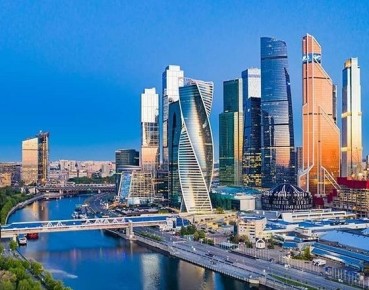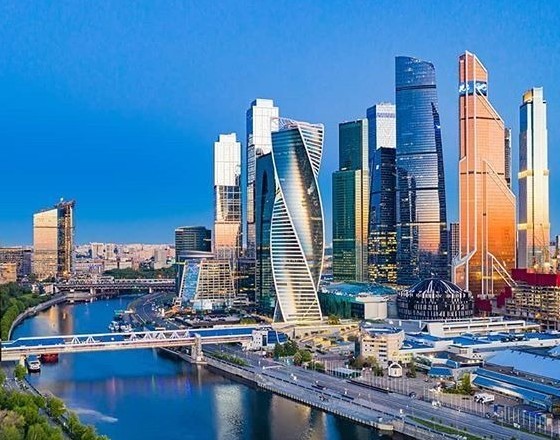
Moscow International Business Center, Russia (Igorkhait, CC BY-SA 4.0)
The Russian financial regulator wants to change Russia’s existing anti-money laundering law, allowing it to create a single platform shared with commercial banks for the evaluation of companies’ trustworthiness.
According to the draft amendment to the Russian anti-money laundering law, obtained by RBC, the Bank of Russia hopes to expand its compliance capabilities by obtaining data directly from commercial banks and sharing them with the whole banking sector through the single platform.
The proposed Know Your Customer (KYC) platform will allow credit institutions to assess the financial integrity of Russian companies, dividing them into three separate categories: red, yellow and green. According to RBC, the financial regulator expects the platform to be ready for use by the end of the year.
Currently, all Russian commercial banks have to abide by the existing anti-money laundering legislation, which is designed in a way that leaves a lot of space for the banks to act independently. Russian commercial banks have so far been allowed to block their clients’ accounts independently and based on their own risk assessments of the clients.
The role of the Russian central bank has so far been limited to creating guidelines for commercial banks, outlining the typical signs of money laundering, such as the transfer of several million Rubles to an account of a recently created company, which commercial banks should keep an eye on.
The new system will be much more centralized, with the Bank of Russia playing the central role. Russia’s central bank will work on the platform together with the county’s Fintech Association, a loose collection of both private and state financial entities committed to the development of the Russian Fintech sector.
Bank of Russia’s algorithm will work with hundreds of thousands of data points, sorting Russian companies into categories based on more than a hundred criteria marks. Several risk categories attached to each of the bank’s operations, such as reputational risks, sectoral risks, risk attached to involvement in dubious transactions, etc., will be marked separately, giving each bank a unique score.
However, the fine details of the functioning of the platform are still in the making.
Reactions vary
Generally speaking, the reactions from the Russian commercial banks to the new rule have been mainly positive. The banks believe that with new rules will come fewer responsibilities on their part. The Russian financial media outlet VFM.RU reported last year that the severe penalties imposed on banks non-compliant with the existing anti-money laundering rules often lead to over-blocking.
Fearing – in the worst case scenario – a loss of their banking license, many banks have been engaged in preemptive account blocking of clients, often leading to significant financial losses, particularly for Russian small and medium-sized businesses.
The new rules could lift lot of that burden from the shoulders of the banks. For example, in an interview for RBK, the director of the financial monitoring department at Rosbank, Alexander Popov, said that the new platform will make the work of commercial banks easier.
The head of Raiffeisenbank Russia’s compliance control department Philip Khyshiktuev told the same outlet that the assessment made by the Bank of Russia will, “expand the overall industry expertise and improve the quality of customer experience.”
Representatives of the Otkrytie Bank and Alfa-Bank expressed a similar sentiment towards the proposed changes of the Russian anti-money laundering legislation, welcoming the new platform as a cost reducer for commercial banks.
Conversely, business representatives interviewed by VFM expressed a rather different sentiment, pointing out that the new rules are excessive and come at a rather unfortunate time. “I see a large number of innovations coming from the regulator (Bank of Russia), some of them seem to me to be quite excessive. I don’t know how timely it is now when many are going through very difficult times,” the President of the All-Russian Union of Insurers, Igor Yurgens, told the online outlet.
International context – Russian money abroad
From an international perspective, Russia’s attempts to fight money-laundering, with a focus on the country’s struggling SMEs, seems analogous to sweeping the floor in a house that is on fire.
According to some estimates, Russia has the world’s largest volume of money hidden abroad – about USD 1 trillion – both in absolute terms and as a percentage of its national GDP.
The nature of the destination assets, according to the same source, is rather uncertain: “some of the offshore wealth might be invested in Russian corporations, and some might be invested abroad (e.g. a mansion in London, a castle in France, or a company in Germany, the US or elsewhere).”
Whatever the exact amount of Russian wealth hidden abroad, it is beyond doubt that much of those funds left the country in a manner that most financial institutions around the world would classify as “money laundering”.
It is no secret that a large number of Russia’s wealthiest businessmen own their domestic companies through entities registered in low-tax offshore jurisdictions like Cyprus or the British Virgin Islands. And it is not a coincidence that wealthy Russians choose to hide their wealth in places where financial secrecy is of the utmost value.
To be fair, the issue of Russian money being held abroad has not been entirely out of the mind of the Russian government. In his televised speech on March 2020, Russia’s President Vladimir Putin called for long-term changes to the nation’s Tax Low to target its richest individuals.
He said that he would increase taxes on dividend and interest payments that Russian-based companies are transferring to their owners’ offshore bank accounts to 15 per cent. The Russian President also said that about two-thirds of those payments are currently taxed at only 2 per cent.
However, according to a poll carried out by a Moscow-based law firm among around 300 high-net-worth Russian individuals, the policy initiative didn’t have the desired effect. Quite the opposite — the study showed that as many as 40 per cent of those with offshore companies had given up their Russian residency. Another 9 per cent had transferred their assets to family members living abroad.
A survey published by EY and international real estate broker Tranio in February 2020, shows that the most-favoured countries to gain tax residency status for rich Russians are Malta (42 per cent), the UK (31 per cent), and Switzerland (25 per cent). Switzerland is also the most in demand among Russians wanting to open a bank account (98 per cent), followed by the UK (66 per cent) and Cyprus (37 per cent).
Whatever the Bank of Russia’s intention with the new anti-money laundering rules, it is quite clear that it will only affect the country’s small and medium-sized business owners, leaving the question of the elephant in the room unaddressed.

